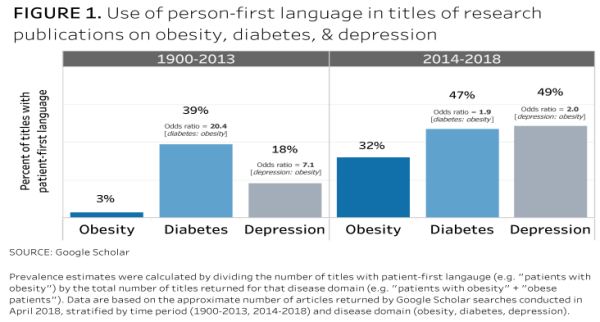Language matters. The words we use to discuss health and disease directly impact beliefs, behaviors, and experiences.
The language health professionals use to initiate conversations about weight, their sensitivity to weight bias, and how conversations about weight are conducted all affect the quality of care delivered and the likelihood that patients with obesity will initiate appropriate disease management efforts. In comparison to providers who use people-first language (e.g. patient with obesity), those who use disease-first language (e.g. obese person) exhibit more explicit weight bias. One study found that 2 in 5 patients who perceived weight stigmatization by a healthcare provider would either seek a new doctor or forgo future medical care altogether.
Fortunately, there are some beacons of progress. In response to our 2015 letter to the editor, the journal Obesity revised its guidelinesto require that all authors refrain from using “pejorative adjectives or adverbs when describing individuals with overweight or obesity” and from “directly or indirectly attribut[ing] moral judgments or character flaws to [persons with obesity] in their writing.” In June 2017, the American Medical Association (AMA) joined in ongoing efforts to destigmatize obesity and improve treatment by resolving to use people-first language in all discussions and reports regarding obesity.
The positive impact of these collective efforts to destigmatize obesity are reflected in Figure 1, in which we provide an update on a 2014 analysis conducted by Ted Kyle and Rebecca Puhl. Among research articles returned by a Google Scholar search for publications prior to 2014, the odds of using people-first language in the title were 20 times higher for articles on diabetes and 7 times higher for articles on depression, relative to articles on obesity. Among items published since 2014, the odds of people-first language in the title for articles on obesity approach those of diabetes and depression-related articles: a search for “obese patients” returned approximately 28,600 titles, while “patients with obesity” returned approximately 13,300 titles.
Consistent use of medically-appropriate, non-stigmatizing terms to discuss obesity in popular media, policies, and academia will be essential to change the perceptions of providers, patients, and the public. When obesity is conceptualized as a disease rather than an identity, people affected by obesity are more likely to receive the respectful, comprehensive care that they deserve and to achieve their weight-related health goals. Additional research is needed to determine the association between increased adoption of people-first language and experiences of weight discrimination among individuals with obesity. However, there is unequivocal evidencethat weight bias can undermine obesity prevention and treatment efforts and finding ways to mitigate it should be a priority for all health professionals.



